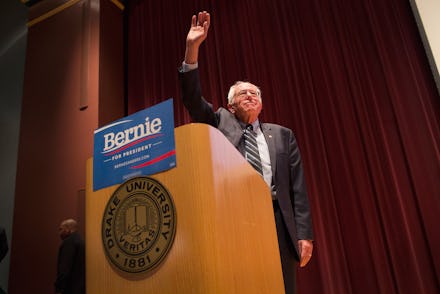New Poll Shows the Bernie Sanders Surge Is Spreading to Iowa

Bernie Sanders is surging in the Midwest.
A new Bloomberg poll out of Iowa shows the independent senator from Vermont closing the gap on Hillary Clinton, with Clinton falling to 50% support among likely Democratic caucus-goers as Sanders jumps to 24%. That margin represents a 16-point bounce from the 42-point gulf that existed between the candidates in early June.
Twenty-three percent of respondents in the Bloomberg survey said they were either uncommitted or undecided. That's welcome news for the Sanders campaign, which has significantly more room to grow its support than Clinton, who is a known quantity among diehard Democrats. In this case, the polls bear out that conventional wisdom: Clinton has a 88% favorability rating in Iowa to Sanders' 57%, but her unfavorables are more than double his. Nearly 40% said they didn't know or were "not sure" about Sanders — an indication that his popularity could rise over time as voters in the Hawkeye State get to know him.
Notice a trend? Sanders' slice of the pie is expanding in New Hampshire, too. Last week, a poll from Suffolk University found him trailing Clinton by only 10 points, 41% to 31%, making the race even tighter than indicated by Morning Consult, whose survey found a 12-point gap. Both polls showed a significant number of undecided voters and supporters for Vice President Joe Biden, who is unlikely to run.
A new face: Sanders may be 73 years old, but to many in Iowa — anyone outside New England and Washington, D.C., really — his voice is fresh, and the rationale for his campaign is resonating.
Asked in the Bloomberg poll who is better described as willing to "take on Wall Street and financial elites," Sanders bested Clinton by 18 points, 48% to 30%. On the question of authenticity — "what you see is what you get" — Clinton again finishes a distant second, this time trailing with 30% to Sanders' 47%.
Clinton's big advantages come on foreign policy and perceived electability. She holds a staggering 81 point lead on the question of who would be "better described" as having the "experience to navigate a dangerous world." Clinton also beats out Sanders, by a 72% to 12% margin, when voters were asked about the candidates' likelihood of defeating "the Republican nominee in the general election."
While Sanders will have a tough time matching the former secretary of state if the race comes down to foreign policy bona fides, the other issues will be more malleable. If Sanders defeats Clinton in Iowa or New Hampshire, or both, doubts over his electability might not go away, but the nature of the question will change.
The nature of this race already has. On Thursday morning, a super PAC backing former Maryland Gov. Martin O'Malley released a web video attacking Sanders on his record of voting against or failing to back more restrictive gun control measures. Voters have been paying attention to the junior senator from Vermont for months; now the other candidates are being forced to do the same. O'Malley, who had been touted as Clinton's foremost challenger, sees his lane narrowing, and it is the insurgent Sanders poised to run him off the road.
Correction: June 26, 2015